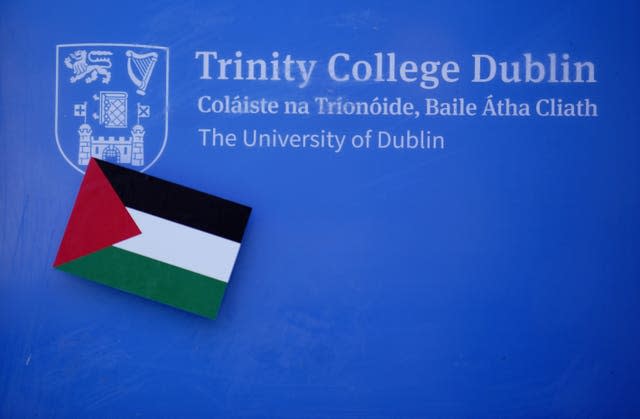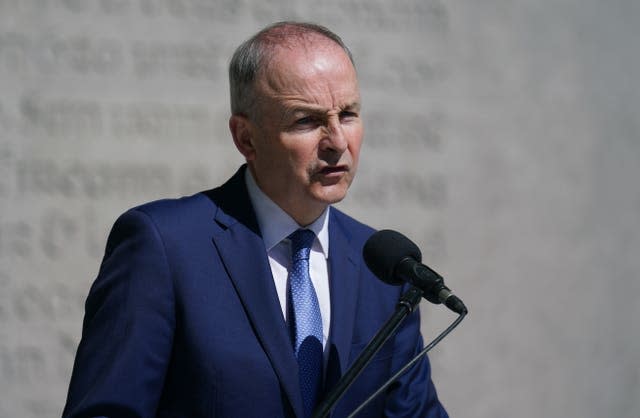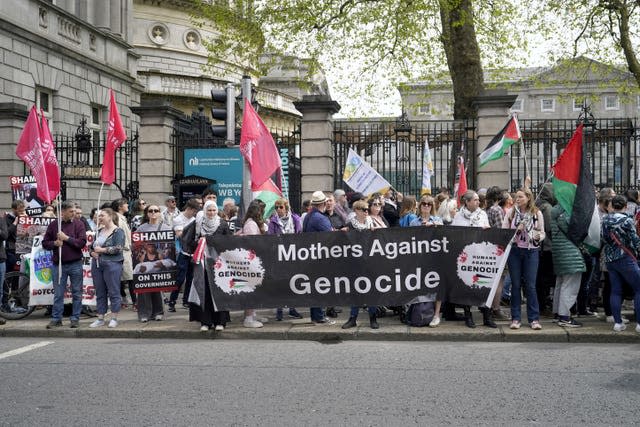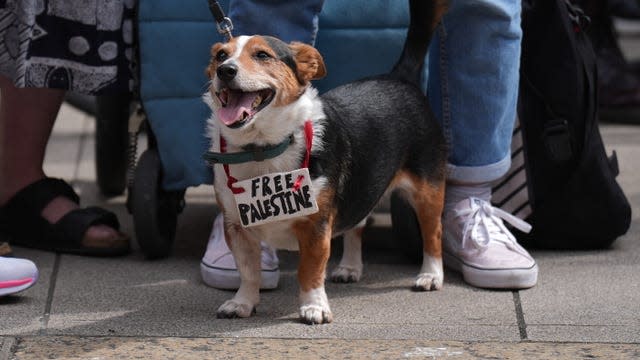Trinity students end encampment after divestment pledge
A student encampment protest at Trinity College Dublin is to end following an agreement between senior management and protesters.
Visitors have been unable to access the historic Book of Kells since action began on Friday evening when the activists set up tents inside the campus of the prestigious Dublin university.
The students taking part in the protest had vowed to maintain the blockade until the university cuts all ties with Israel.
University management met with student representatives on Wednesday to discuss the situation.
In a statement, Trinity said it will complete a divestment from investments in Israeli companies that have activities in the Occupied Palestinian Territory and appear on the UN Blacklist in this regard.
This process is expected to be completed by June.
It said it would “endeavour” to divest in other Israeli companies, noting that its supplier list contains just one Israeli company which will remain until March 2025 for contractual reasons.
Senior Dean Professor Eoin O’Sullivan, who led the talks for Trinity, said: “We are glad that this agreement has been reached and are committed to further constructive engagement on the issues raised.
“We thank the students for their engagement.”
Trinity said plans are being put in place to return to normal university business for staff, students, and members of the public.

Outgoing students’ union president Laszlo Molnarfi said the resolution of talks with the university was an “unprecedented” result.
Speaking to the PA news agency, Mr Molnarfi said: “Students, staff and the public united have pushed Trinity towards boycott, divestment and sanctions (BDS).”
He said he hopes the protest at the university will inspire other students.
“It shows the power of grassroots student and staff fighting for a just cause of Palestinian liberation and to end complicity with Israeli genocide, apartheid and settler colonialism.
“Students over the world are standing up for what is right.”
In its statement on Wednesday, Trinity said: “We fully understand the driving force behind the encampment on our campus and we are in solidarity with the students in our horror at what is happening in Gaza.
“We abhor and condemn all violence and war, including the atrocities of October 7th, the taking of hostages and the continuing ferocious and disproportionate onslaught in Gaza. The humanitarian crisis in Gaza and the dehumanisation of its people is obscene.
“We support the International Court of Justice’s position that ‘Israel must take all measures within its power to prevent and punish the direct and public incitement to commit genocide in relation to members of the Palestinian group in the Gaza Strip.’
“A real and lasting solution that respects the human rights of everyone needs to be found.”
The scenes at Trinity follow a wave of similar student protests at university campuses across the US.
The encampment was initiated days after it emerged that the university authorities had fined the students’ union more than 200,000 euro over previous protests on campus.
It invoiced the union for 214,285 euro after a series of demonstrations about fees and rent, as well as pro-Palestinian solidarity protests.
The university cited a loss of revenue due to blockades of the Book of Kells and famous Long Room library among the reasons for the fine.
The protesting students called for a “retroactive amnesty” for students involved in protests on campus and the rescinding of the bill imposed on the student’s union.
Asked about the status of the fines, Mr Molnarfi said this was a matter for further engagement with the university.
Trinity is also establishing a taskforce on related matters with student and staff representatives, led be an external chair.

Elsewhere, the Irish deputy premier said he is “horrified” by events unfolding in Rafah, describing the levels of violence as “unconscionable”.
Israel has threatened to launch a full-scale assault on the southern Gaza city.
More than one million civilians are sheltering in Rafah after evacuating other parts of Gaza amid Israel’s war in the region.
The Israeli military seized control of Gaza’s vital Rafah border crossing on Tuesday.
On Wednesday, Israeli troops said they had reopened the Kerem Shalom crossing into Gaza, a key terminal for the entry of humanitarian aid that was closed nearly three days earlier after a Hamas rocket attack.

Tanaiste Micheal Martin said he was “really horrified” with the events.
Speaking at the Arbour Hill commemoration event, Mr Martin said: “It’s quite shocking, the level of human suffering.
“The civilian causalities, death and very serious injuries on a daily basis being (endured) by the people of Gaza.
“The taking of the Rafah crossing, for example, creates huge challenges for humanitarian aid getting into Gaza.
“I have seen myself the amount of aid has been stopped already.
“There is an urgent need for medicines, for food and for the basics of life to get in for the people of Gaza.
“It’s only unconscionable that this level of violence continues.

“We need an immediate ceasefire and the release of all hostages and then we need discussion on the political track on how Gaza is reconstructed because what the people have gone through there is quite horrific and it is shocking and unacceptable, it has to stop.”
On Wednesday, protesters from the Ireland-Palestine Solidarity Campaign gathered outside Leinster House in support of the hundreds of thousands of Palestinians in Rafah.
Demonstrators waved Palestine flags and called for Israel not to invade Rafah and to impose sanctions against Israel.

 Yahoo News
Yahoo News 
